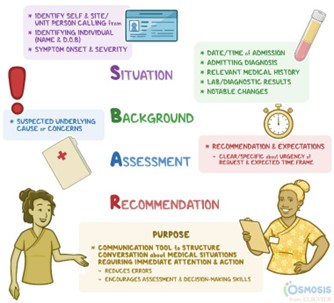A nurse asks an assistive personnel (AP) to take a specimen to the laboratory, and the AP refuses. Which of the following actions should the nurse take?
Discuss the incident with the AP.
Complete an incident report.
Take the specimen to the laboratory.
Report the AP to the charge nurse.
The Correct Answer is A
If an assistive personnel (AP) refuses to take a specimen to the laboratory, the nurse should first discuss the incident with the AP. This allows the nurse to understand the reasons for the refusal and to address any concerns or issues that may have led to the refusal.
Option B may be necessary at some point, but it should not be the first response.
Option C may also be necessary to ensure that the specimen is delivered to the laboratory in a timely manner, but it does not address the underlying issue.
Option D may also be necessary at some point, but it should not be the first response.
Nursing Test Bank
Naxlex Comprehensive Predictor Exams
Related Questions
Correct Answer is A
Explanation
The charge nurse is demonstrating the right of supervision by checking with other nursing personnel on the unit throughout the day to determine if they are completing tasks. This means that the charge nurse is providing appropriate supervision and monitoring of the delegated tasks to ensure that they are being completed correctly and that the client's needs are being met.
Option B is incorrect because it refers to ensuring that the circumstances are appropriate for delegation.
Option C is incorrect because it refers to delegating tasks to the right person who has the appropriate skills and knowledge to complete them.
Option D is incorrect because it refers to clear communication between the delegator and delegatee about the task being delegated.

Correct Answer is ["A","B","C","E"]
Explanation
SBAR stands for Situation, Background, Assessment, and Recommendation. It is a systematic method of communication that provides a structured framework for conveying important information about a patient. To ensure that the report is thorough, the nurse needs to include information about the situation of the patient, the background leading up to the situation, an assessment of the patient, and recommendations for moving forward.
Option d is incorrect because barriers to providing treatment are not part of the SBAR framework.
Option f is incorrect because the reason why the report is needed is not part of the SBAR framework.

Whether you are a student looking to ace your exams or a practicing nurse seeking to enhance your expertise , our nursing education contents will empower you with the confidence and competence to make a difference in the lives of patients and become a respected leader in the healthcare field.
Visit Naxlex, invest in your future and unlock endless possibilities with our unparalleled nursing education contents today
Report Wrong Answer on the Current Question
Do you disagree with the answer? If yes, what is your expected answer? Explain.
Kindly be descriptive with the issue you are facing.
